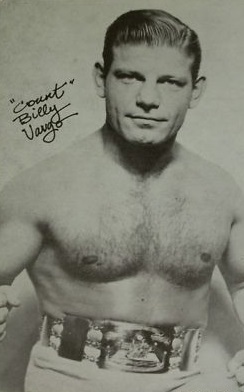1. Early life and education
William Joe Varga's early life was deeply influenced by his family's background in professional wrestling, which set the foundation for his own distinguished career. His education progressed from high school in Hollywood to a university degree.
1.1. Birth, family, and formative years
William Joe Varga was born on January 10, 1919, in Cleveland, Ohio. His parents were Rose and Joe Varga. His father, known as Count Joseph Varga, was a professional wrestler in Europe and introduced his son to the sport at a very young age, teaching him wrestling from the age of five. This early exposure to the ring profoundly shaped his future.
1.2. Education
Varga attended Hollywood High School, establishing his roots in the heart of the entertainment industry. He furthered his academic pursuits by graduating from the University of Southern California, a period that coincided with his developing athletic talents.
2. Career
William Joe Varga pursued a versatile career that spanned both the demanding world of professional wrestling and the dynamic field of acting, excelling in both domains throughout his life.
2.1. Professional wrestling
Varga's professional wrestling career saw early success. He secured the world's light-heavyweight title in 1941, a testament to his skill and dedication. Following this achievement, he served in the United States Navy, returning home in 1947. His wrestling career continued through the decades, but by the 1970s, his commitments to television and movie roles increasingly took precedence, leading to a gradual decline in his wrestling activities as his acting work became his primary focus.

2.2. Acting
Varga transitioned significantly into acting, appearing in numerous films and television series. His notable roles include:
| Year | Title | Role | Notes |
|---|---|---|---|
| 1949 | Alias the Champ | Wrestler | |
| 1949 | Bodyhold | Marvelous Milton | |
| 1953 | The Abbott and Costello Show | The Big Guy | |
| 1953 | Miss Sadie Thompson | Marine | Uncredited |
| 1955 | Abbott and Costello Meet the Keystone Kops | Guy outside theater that throws Bud | Uncredited |
| 1960 | Shotgun Slade | Snag | Episode: "The Smell of Money" |
| 1961 | It Started in Tokyo | Mark | Uncredited |
| 1962 | Convicts 4 | Guard #7 | |
| 1962 | The Jack Benny Program | Himself | Episode: "The Story of Jack Referees Wrestling Match" |
| 1964 | The Munsters | Strangler Murphy | Episode: "Herman the Great" |
| 1965 | Burke's Law | The Count | Uncredited, Episode: "Who Killed the Strangler?" |
| 1973 | Oklahoma Crude | Cook | |
| 1976 | Ellery Queen | Security Guard | Episode: "The Adventure of the Tyrant of Tin Pan Alley" |
| 1980 | Raging Bull | Ring announcer - Third Robinson Fight | |
| 1985 | Grunt! The Wrestling Movie | Coach Rocko | |
| 1985 | Pro Wrestling Finishing Holds Vol. 1 with Gene LeBell | Self | |
| 1986 | Bad Guys | Referee | |
| 1986 | Stewardess School | Fight Manager | |
| 1991 | Alligator II: The Mutation | Announcer | (final film role) |
3. Championships and accomplishments
During his wrestling career, William Joe Varga accumulated several significant championships:
- 50th State Big Time Wrestling
- NWA Hawaii Heavyweight Championship (1 time)
- NWA Hawaii Tag Team Championship (1 time) - with Sam Steamboat
- NWA Hollywood Wrestling
- NWA International Television Tag Team Championship (3 times) - with Hardy Kruskamp (2 times) and Mario LaPentero (1 time)
4. Personal life
William Joe Varga was married to Rosabelle Varga, who passed away in 1992. He resided in Northridge, California, for a significant portion of his life. He had three sons: Billy, Courtland, and Royce, all of whom unfortunately preceded him in death. Varga was also a grandfather to five grandchildren. In his later years, he suffered from Alzheimer's disease, with the condition manifesting by early 2005.
5. Death
William Joe Varga died on January 11, 2013, just one day after his 94th birthday. His passing occurred in Burbank, California.
6. Legacy and reception
Count Billy Varga left a notable legacy as both a professional wrestler and an actor. In the world of professional wrestling, his achievement of winning the world's light-heavyweight title in 1941 cemented his status as a formidable competitor. His post-military return to the sport and continued presence for decades further demonstrated his enduring dedication. As an actor, Varga seamlessly transitioned into film and television, becoming a recognizable face in numerous productions. His ability to maintain a dual career, balancing the physical demands of wrestling with the performance requirements of acting, highlighted his versatility and adaptability. His career spanned from the golden age of wrestling to a consistent presence in Hollywood, making him a unique figure who contributed to both sports entertainment and popular culture.